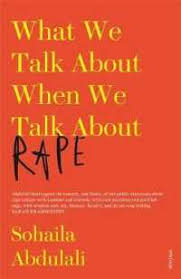
What We Talk About When We Talk About Rape
Neither a memoir nor an academic study but a deeply personal and meticulously researched rallying cry and required reading for us all.
Except for the foundational belief that rape is a crime, with a criminal and a victim, I will not take anything else for granted.
Sohaila Abdulali was gang-raped as a teenager in Bombay. Indignant at the silence on the issue in India, she wrote an article for a woman?s magazine challenging the way in which rape and rape victims were perceived. Thirty years later her story went viral in the wake of the 2012 fatal gang rape in Delhi and the global outcry that followed.
Drawing on her own experience, her work with hundreds of survivors as the head of a rape crisis centre in Boston, her research, and three decades of grappling with the issue personally and professionally, WHAT WE TALK ABOUT WHEN WE TALK ABOUT RAPE is about changing the conversation around rape culture, questioning our assumptions, and deciding how we want to raise the next generation.
Sohaila asks pertinent questions: Is rape always a life-defining event? Does rape always symbolise something? Is rape worse than death? Is rape related to desire? Who gets raped? Is rape inevitable? Is one rape worse than the other? Who rapes? What is consent? How do you recover a sense of safety and joy? How do you raise sons? Who gets to judge? She doesn?t pretend to have all the answers, but she passionately believes that we must talk about rape and we must talk about HOW we talk about rape, and as she says, draws shamelessly on the fact that she is both victim and survivor.
#metoo, sexual assault, sexual harassment, the womens march. Never has the disparity between how men and women are treated in particular environments been interrogated more ? in the media and in private discussions.
